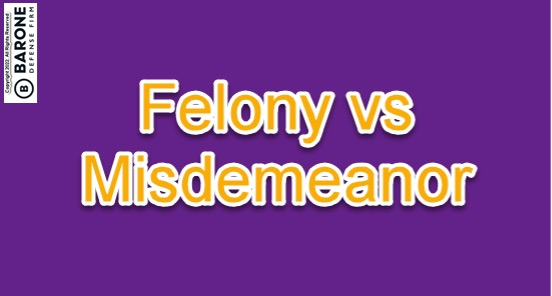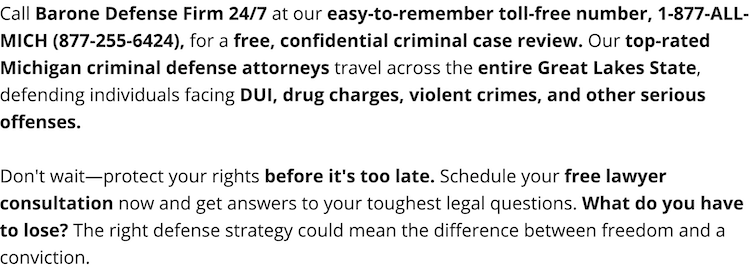Difference Between Felony vs Misdemeanor under Michigan Laws
In the United States, a set of federal criminal laws exists that cover federal crimes and misdemeanors. Similarly, all fifty states and the District of Columbia have enacted their own criminal laws as part of their codification of statutes applicable to criminal activities that occur within their state.
These state laws outline misdemeanor vs felony offenses. This article provides the reader with a misdemeanor definition legal history overview. As you will learn, serious traffic violations (like OWI-DUI convictions, hit and run and reckless driving) are common misdemeanors that normal, working-class citizens encounter.
In Michigan, What is a Felony?
All states also have various "gradations" and types of misdemeanors and types of felonies. So, you must think in terms of fifty-one non-federal criminal justice systems for the states and DC, passing their own sets of laws pertaining to crimes committed within their respective borders.
Misdemeanor meaning. When asked to define "misdemeanor," Merriam-Webster succinctly explains the definition of a misdemeanor this way:
In American law, a misdemeanor is "a crime less serious than a felony."
This dictionary passage does clear up one other common misconception, and that is that only criminal misdemeanor offenses exist. Anything non-criminal is called an infraction.
Many states do not have traffic infractions, and only have misdemeanor or felony driving crimes. In the Great Lakes State, the answer to clients asking, "In Michigan, is a misdemeanor a criminal offense? is "YES."
Often, the 2nd most common inquiry will be, "Is a DUI a misdemeanor?" Driving under the influence is a misdemeanor in all states unless it is a repeat drunk driving offense and has reached the felony prosecution level.
Then comes their next, related inquiry, "Can you go to jail for a misdemeanor?" If convicted, yes, and for any DUI offense you will suffer an immediate license suspension in every OWI-DUI case.
Consistently, a misdemeanor definition will be much less severe, when compared to that same state's felony version of the crime (e.g., misdemeanor DUI vs felony DUI). The same rule applies to "battery" offenses, where a first offense with minor bruising or contact is a misdemeanor, and 2nd offenses can be a felony.
Although primarily derived from English Common Law principles, some American legal concepts and principles were adopted from the French legal system and the Spanish legal system. On the west coast, more Spanish influence exists for certain civil laws, like in divorce cases.
In Michigan, What Is the Difference Between a Felony and Misdemeanor Offenses?
How Felony Crimes are determined. Each governing entity (state or commonwealth in the USA) criminalizes certain activities, and the punishment schemes can vary widely. The legislative branch of government handles these tasks.
What constitutes criminal felony class or felony level offenses is a legislative function. What is considered a misdemeanor offense is also left to the discretion of the state governing legislators, much like Congress enacts federal criminal laws.

What constitutes a felony? A good example of this is the current national struggle to undo President Richard Nixon's 1971 insistence (over objections from federal scientists) on the United States categorizing marijuana as a dangerous drug, creating a federal felony. Most states then followed that model.
Nixon pushed Congress to make marijuana possession a felony, thereby making any drug possession of weed a mandatory jail offense, on the same level as possessing opioids and other highly deadly substances. This flawed federal government leadership has led to many needless criminal records of felonies for marijuana users.
The Difference between Misdemeanor crimes and Infractions. Many states (including Michigan) have "infractions," pertaining to minor traffic violations like speeding. Other states, like Georgia, Alabama, Florida, and South Carolina do not use infractions, and make all crimes either misdemeanors or felonies.
Also, the legislative branch of government in most states have classes or levels of criminal acts, such as "first degree" and "second degree," or they may use "classes" of crimes, such as Class A, Class B, etc. Michigan has a version of such laws for several crimes of degree.
Punishments for Misdemeanors and Felonies
Punishments for misdemeanors and felonies in Michigan can vary, depending on specific crimes committed and the individual's criminal history. While felonies are considered more serious than misdemeanors, both can result in punishments such as fines and jail time.
In Michigan, the main types of misdemeanors are Class A, B, and C. Class A crimes are considered the most serious type of misdemeanor. While specific punishments may vary from person to person, potential penalties include jail time (up to 1 year) and fines up to $2,000.
Punishments for Class B misdemeanors can also vary but generally include fines and/or jail time. If you're charged with a Class B misdemeanor, you may face up to 90 days in jail and fines of up to $500.
Class C misdemeanors are generally considered the least serious punishable crimes in Michigan. Punishments for Class C misdemeanors include up to 30 days in jail and fines up to $250.
Punishments for felonies in Michigan are much stricter. Felonies are classified as A through H, with A being the highest classification.
Depending on the severity of the crime, punishments for felonies in Michigan can range from probation or a few years in jail to life in prison.
If You’re Facing Criminal Charges, You Need an Attorney
Whether you're facing misdemeanor charges or you've been charged with a felony, securing professional representation is extremely important. At Barone Defense Firm, our legal team has over 100 years of collective legal experience. You can count on us to provide fair representation, and we'll work hard to obtain the best possible results.
Michigan Criminal Defense Attorneys Near You
If you've been charged with a misdemeanor or a felony, the lawyers at Barone Defense Firm are standing by and ready to assist. Our practice areas range from DUI/OWI to federal crimes, sex crimes, and gun crimes, and we look forward to serving you.
Our firm's service areas include:
 Barone Defense Firm Home
Barone Defense Firm Home
















